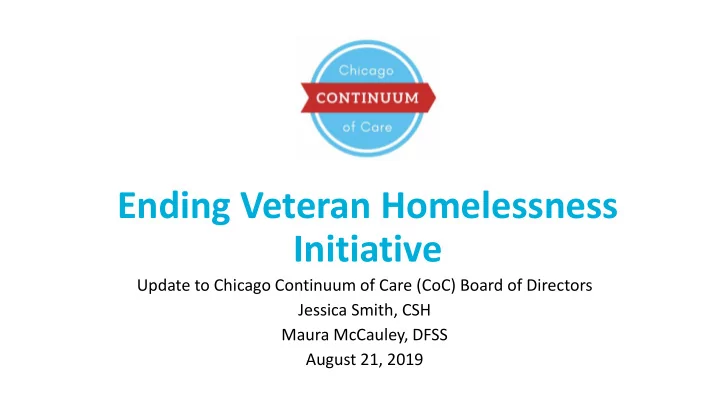

Ending Veteran Homelessness Initiative Update to Chicago Continuum of Care (CoC) Board of Directors Jessica Smith, CSH Maura McCauley, DFSS August 21, 2019
Accomplishments to Date • Began in 2015 and served as the pilot for what is our current Coordinated Entry System • Created the One List (by-name list of Veterans) through partnership with Jesse Brown VAMC and the CoC • Tested implementation strategies: case conferencing, housing navigators, skilled assessors, outreach coordination • EVHI’s Leadership and Implementation team structure served as basis for the CoC’s new governance and implementation structures through the Action Agenda. • EVHI’s data -driven decision-making process led to HMIS dashboards – the precursor to the CoC’s Dashboard to End Homelessness. • Since 2015, the CoC has: • Reduced Veteran homelessness by 28%. • Moved more than 5,000 Veteran households to permanent housing.
Dedicated Veteran Resources • $22 million for VA transitional and permanent housing Program Approximate # of Units/Beds HUD VASH: permanent supportive housing – CHA voucher + 1,282 units intensive support services from Jesse Brown VAMC) Supportive Services for Veteran Families (SSVF): short- 265 units medium term prevention or rapid rehousing assistance. Financial assistance + services Grant and Per Diem (GPD): project-based and scattered-site 216 beds transitional housing. Includes medical respite, service – intensive, and clinical models
Crisis Response Services Community Resource and Referral Center (CRRC) • Co-located at A Safe Haven. CRRC provides case management, referral services, transportation to VA Medical Centers, and offers space for community partners to meet with Veterans onsite. • Social workers are trained in Diversion, and serve as CES Skilled Assessors VA Contract Transitional Beds • Located at A Safe Haven and provides immediate, short-term transitional housing for Veterans entering our system. Referrals come from VA Medical Centers and the Community Resource and Referral Center
EVHI Current State
EVHI 2019 Priorities Implement a Diversion strategy • Reduce our Veteran inflow and ensure resources are going to our most vulnerable Veterans • Reduce the impact of homelessness on the Veterans in our community • Chicago participated in a Rapid Resolution pilot project (SSVF) that is now incorporated into our broader Diversion strategy Reduce the length of time from identification to housed • Weekly case conferencing with service providers to identify best practices, address barriers, and share resources, in particular housing and landlords • Coordinate services for Veterans working with multiple providers to streamline services • Coordinated with SSVF grantees responding to applications for additional funding to support system-level staff to serve as Diversion Specialists, Housing Specialists, and Skilled Assessors End chronic homelessness among Veterans • Currently, 138 Veterans on our One List are experiencing chronic homelessness • Intentional case conferencing and resource building
Recommend
More recommend